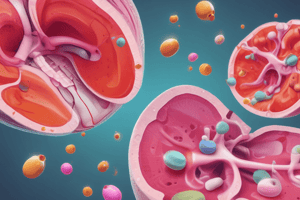Podcast
Questions and Answers
Which type of stones are clearly the result of excess dietary calcium?
Which type of stones are clearly the result of excess dietary calcium?
- Uric Acid Stones
- Calcium Stones (correct)
- Oxalate Stones
- Cystine Stones
What is the recommended fluid intake for patients with calcium stones?
What is the recommended fluid intake for patients with calcium stones?
- No fluid intake is necessary
- Fluid intake should be limited
- Liberal fluid intake is encouraged (correct)
- Moderate fluid intake is recommended
Which medication may be used for patients with calcium stones?
Which medication may be used for patients with calcium stones?
- Potassium Alkali Salts
- Ammonium Chloride (correct)
- Allopurinol
- Thiazide Diuretics
What type of diet is recommended for patients with uric acid stones?
What type of diet is recommended for patients with uric acid stones?
Which procedure involves visualizing and destroying the stone using a ureteroscope?
Which procedure involves visualizing and destroying the stone using a ureteroscope?
What is the purpose of endoscopic or other interventional procedures for kidney stones?
What is the purpose of endoscopic or other interventional procedures for kidney stones?
Which of the following is a potential complication of kidney stones?
Which of the following is a potential complication of kidney stones?
What is the purpose of a percutaneous nephrostomy tube?
What is the purpose of a percutaneous nephrostomy tube?
Which surgical procedure may be performed if the kidney is nonfunctional secondary to infection or hydronephrosis?
Which surgical procedure may be performed if the kidney is nonfunctional secondary to infection or hydronephrosis?
What is the main goal for a patient with kidney stones?
What is the main goal for a patient with kidney stones?
What is a potential collaborative problem of kidney stones?
What is a potential collaborative problem of kidney stones?
What is the most common complication of kidney stones?
What is the most common complication of kidney stones?
Which of the following is NOT a potential complication of renal calculi?
Which of the following is NOT a potential complication of renal calculi?
What is the recommended sodium intake for a patient with renal calculi?
What is the recommended sodium intake for a patient with renal calculi?
Which of the following is NOT recommended to prevent renal calculi?
Which of the following is NOT recommended to prevent renal calculi?
What is the recommended fluid intake for a patient prone to forming renal calculi?
What is the recommended fluid intake for a patient prone to forming renal calculi?
How often should urine cultures be performed for a patient with recurrent urinary tract infections?
How often should urine cultures be performed for a patient with recurrent urinary tract infections?
What is encouraged to prevent excessive sweating and dehydration in patients prone to renal calculi?
What is encouraged to prevent excessive sweating and dehydration in patients prone to renal calculi?
Which of the following is a possible complication of ESWL?
Which of the following is a possible complication of ESWL?
What is the recommended duration for increased fluid intake after ESWL?
What is the recommended duration for increased fluid intake after ESWL?
What should the patient do if they experience unrelieved pain after ESWL?
What should the patient do if they experience unrelieved pain after ESWL?
What is a common expected side effect of ESWL?
What is a common expected side effect of ESWL?
What should the patient do if they have a stent in the ureter?
What should the patient do if they have a stent in the ureter?
What is the nurse's role in follow-up care for a patient with renal calculi?
What is the nurse's role in follow-up care for a patient with renal calculi?
Which of the following is the immediate objective of treatment for renal or ureteral colic?
Which of the following is the immediate objective of treatment for renal or ureteral colic?
What is the role of nonsteroidal anti-inflammatory drugs (NSAIDs) in treating renal calculus pain?
What is the role of nonsteroidal anti-inflammatory drugs (NSAIDs) in treating renal calculus pain?
What is the recommended fluid intake for patients with renal calculi?
What is the recommended fluid intake for patients with renal calculi?
What is the mainstay of most medical therapy for renal calculi?
What is the mainstay of most medical therapy for renal calculi?
What is the role of a high fluid intake in the treatment of renal calculi?
What is the role of a high fluid intake in the treatment of renal calculi?
What were patients with calcium-based renal calculi historically advised to do?
What were patients with calcium-based renal calculi historically advised to do?




